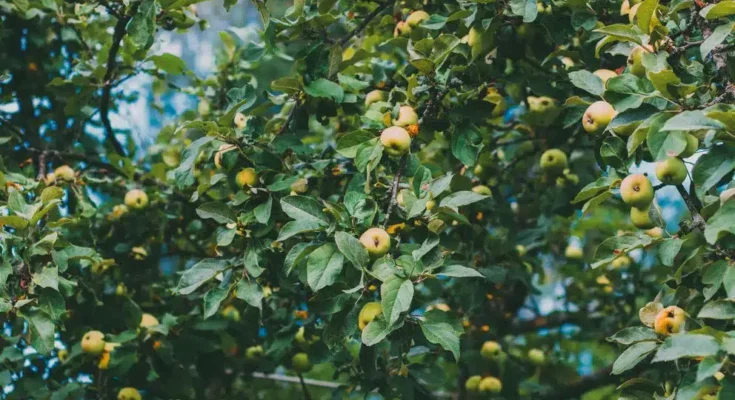My grandparents planted the apple tree the week they moved in, a skinny sapling from my grandfather’s family orchard. It grew up with us—through birthdays and graduations and summers when I fell asleep in its shade with sticky fingers and grass-stained knees. I’m 35 now, living in the house they left me, restoring it room by room: the original ’70s kitchen tiles my grandma loved, the creaky hallway step Grandpa swore gave the place “character,” and at the center of it all, that tree—our living heirloom.
Then Brad and Karen moved in next door.
Brad showed up like a thundercloud—loud, impatient, already scowling. Karen was all tight smiles and sharper words, latte cup held like a crown. Within three weeks, she was at my door.
“Your tree is a problem,” she announced. “We’re putting in a hot tub. The shade kills the vibe.”
“It’s entirely on my side,” I said. “It doesn’t cross the fence.”
“Sunlight doesn’t respect property lines,” she replied, as if that settled the law and the world.
The next day, Brad banged on my door. “You really gonna be like this? It’s just a tree.”
“It’s my grandparents’ tree,” I said. “It’s been here fifty years.”
He shrugged. “They’re not around to miss it.”
I offered peace the way my grandmother would have: “When the apples ripen, I’ll bring you some.”
Karen wrinkled her nose. “Yeah, no thanks.”
I thought that would be the end of it.
Three days into a long-awaited cabin getaway, my neighbor Rachel texted: “Think Brad and Karen have tree guys there. Chainsaws. Wood chipper.” I opened my home security app—grainy, lagging, but clear enough: men in my yard, near the apple tree.
I drove eight hours without music, the road a long, gray wire strung between my teeth and my gut. The smell hit me before the sight did—fresh-cut wood, sweet and wrong. The tree was gone. In its place: a raw stump circled by sawdust and splintered memory. I stood there like you do at a graveside. Then I crossed the lawn and knocked.
Karen answered with a glass of white wine and a party smile. “We had it taken down,” she said. “You’re welcome. More sunlight for both of us.”
“It was on my property,” I said. “You had no right.”
“Dramatic,” she said, and sipped.
Brad appeared behind her, smug. “Send us a thank-you card!”
I turned away, not because I was done—but because I wasn’t.
The next call I made was to a certified arborist, the kind who brings clipboards into courtrooms. He crouched by the stump like a detective and measured rings, diameter, health. “You know this would appraise at over eighteen thousand dollars,” he said. “Mature, well-maintained, historic provenance. Not replaceable.”
I handed his report to my lawyer. A letter went out: intent to sue for unlawful removal, trespass, and property damage, with the appraisal attached. Certified mail. Their names on the envelope.
The morning after the letter landed, a landscaping crew pulled into my drive. By dusk, three fast-growing evergreens stood along the fence line, dense and perfectly within code—spaced to spec, roots on my side, foliage high and thick. A living wall. The new trees cast a generous, permanent shade exactly where their hot tub sat.
Brad stormed over, face bright as a siren. “What the hell are you doing?”
“Landscaping,” I said, adjusting my sunglasses. “Replacing what you destroyed. Thought three might be better than one.”
Karen burst onto her patio, phone in hand. “You can’t do this! There’ll be no sun!”
“It’s all legal,” I said. “Unlike hiring someone to cut down a neighbor’s tree.”
Two days later, they arrived at my porch, wild-eyed and waving the legal letter. “Eighteen thousand dollars? For a tree?” Karen screeched. “We don’t have that kind of money!”
“Then you shouldn’t have cut down something you didn’t own,” I said. “Actions, consequences.”
Brad tried, “We’ll countersue. Your tree shaded our yard.”
“The tree was healthy and on my land,” I said. “Security footage confirms trespass. The arborist’s valuation is standard. Good luck.”
They left in a flurry of threats that sounded a lot like panic. The neighborhood cooled to them quickly. People notice who brings zucchini bread in autumn and who brings chainsaws in spring.
Meanwhile, the evergreens thrived. Each week they knit themselves thicker, a soft, green curtain drawing across the sky. By afternoon, the hot tub sat in full, velvety shade. By evening, the golden hour that Karen once monologued about was filtered into a polite dusk. Sometimes I’d catch her watching me through her blinds while I watered the trees, jaw clenched like she could fell them with a glare.
She tried one more time from across the fence. “You’re destroying our lives over a tree!”
“Funny,” I said, coiling the hose. “That’s exactly what you did.”
Brad hovered behind her, exhausted. “You’re turning the neighborhood against us.”
“You did that when you cut down a family tree while your neighbor was on vacation,” I said. “I asked you to respect my property. You didn’t.”
My lawyer kept moving the case forward: arborist’s report, footage, timestamps, documentation. The figure, with fees, edged toward twenty thousand. The statutes are clear where I live—trees aren’t décor; they’re assets. You don’t “borrow” a neighbor’s equity with a chainsaw.
On cool mornings, I sit beneath the evergreens with my coffee. The sound isn’t the same as the apple tree’s—the old leaves had a papery whisper, these murmur like distant rain—but the feeling is close. Sometimes I close my eyes and imagine my grandparents beside me on the patio chairs I refurbished, Grandpa tapping that creaky hallway step rhythm on the armrest. I think they’d approve of the quiet, lawful way I fought back. They taught me to plant what’s worth keeping and to protect it without theatrics.
One afternoon, while the new shade drew a neat line across the fence, I heard Karen’s voice on the other side, low and bitter: “God, I wish we’d never moved here.”
I didn’t turn. I smiled into my cup and said, softly, to no one and to them both, “Me too.”
The evergreens rustled. The house settled. The stump in my yard is still there, ringed with wildflowers now. It won’t grow again—but it reminds me of two people who believed roots matter, and of the simple math of consequence: you can cut down a tree in an afternoon; it can take a lifetime to earn its shade.



